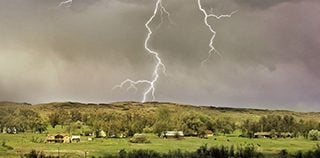Hay fever can be worse at night or in the morning depending on where you live, what pollen you’re allergic to, the time of year and other factors.
Hay fever is caused by an allergy to environmental allergen, e.g. pollen1 - the powdery substance given off by flowers - and may cause pain around the sides of the head and forehead. It can be worse for different people at different times of the day2 and year. That’s because different types of pollen reach their peak at different times3.
It’s a myth that the runny nose, puffed eyes and itchy throat4 typically caused by hay fever are always worse during the day.5
You can manage your symptoms better by understanding how hay fever works, what triggers it and how pollen levels fluctuate.
Is it hay fever?
Hay fever is typically diagnosed if patients get symptoms at specific times of year when certain pollens are high6.
If you think you have hay fever at night, your symptoms could relate to something else, like dust, dog or cat allergies. Dust mites are especially common in bedding, so they’re more likely to affect you at night7.
Ask a pharmacist or doctor if you're not sure if your symptoms are caused by hay fever.
Can hay fever get worse at night?
For some people, hay fever symptoms at night can be even worse than during the day. It depends on the weather , type of pollen you’re allergic to, and your routine. Some pollen counts get higher in the evening and at night8.
Understanding what pollen triggers your allergy can help you to manage the symptoms. Airborne grass pollen9, a common cause of allergy10, can be as high at night as it is during the day. That means a hay fever cough at night, runny nose, itchy eyes and mouth is not unusual. Birch pollen also remains high at night.
Sleeping with the window open can worsen hay fever at night because it allows pollen into your bedroom.
You may also suffer more at night if pollen has become attached to curtains or your bed linen. Keep windows closed during the day to help avoid this, especially when the pollen you are allergic to is high.
Among many symptoms of hay fever, nasal congestion is the most troublesome one because it becomes a major factor interfering with sleep quality and causing daytime sleepiness* .
Can hay fever be worse in the morning?
Sneezing and a runny nose in the morning are common among hay fever sufferers. This is partly because some pollen is released during the morning.11
Your hay fever may worsen in the morning depending on which pollen you are most allergic to and the weather. For example, prolonged heavy rain can decrease the amount of pollen in the air, while moderate wind can increase it.12
If your hay fever is worse in the morning, it's worth considering if any part of your daily routine could be making things worse. Perhaps you cuddle up to your cat in the morning, and it spends all night out in local fields and gardens gathering pollen in its fur. Or, if you tend to throw the windows open in the morning, you might be letting pollen in.
What can I do to manage hay fever symptoms?
There’s a lot you can do to reduce your exposure to pollen and help manage symptoms whether your hay fever is worse at night, in the morning or all day long.
Knowing which pollen you’re allergic to and when the hay fever season is will help you manage your symptoms. Tree pollen tends to be highest in Spring (March to May) and grass and weed pollen in summer (June to August)13.
Leading charity Allergy UK14 says to help manage hay fever symptoms, you can try to:
- keep an eye on pollen forecasts and stay indoors when it is due to be high
- avoid rural areas when pollen is high
- change your clothes and shower after coming in from outdoors when pollen is about
- keep windows and doors closed
- consider buying an air pollen filter for the home
- choose a car with a pollen filter or use the air recirculate button
- use a mask when cutting grass or clearing up leaves (or delegate the job to someone else if you can!)
- wipe pets’ coats down after they’ve been outside because pollen may gather in their fur
- dry clothes indoors when pollen is high .
For some people, medications will be necessary. Common medication include:
- antihistamines, which are widely available over the counter
- nasal sprays
- eye drops
You may need to treat more severe symptoms with prescription medications.
In some cases, desensitisation treatment that involves gradual, controlled exposure to allergens can be used to build tolerance15.
Speak to your doctor or pharmacist for support to manage hay fever symptoms at night and during the day.
In research conducted by Allergy UK and Kleenex16, 49% of people reported suffering with hay fever symptoms.
There’s no need to suffer in silence. Discover what triggers your allergies and the best treatments and products to stop hay fever being a drag in your life.
This article has been expertly reviewed by Jin Zhang, Director of Global Medical Affairs at Kimberly-Clark
1
https://www.nhs.uk/conditions/hay-fever/
2
https://www.ncbi.nlm.nih.gov/pmc/articles/PMC5106497/
3 https://www.kleenex.co.uk/advice/pollen/pollen-calendar
4
https://www.nhs.uk/conditions/hay-fever/
5
https://www.bbc.com/future/article/20190510-five-myths-and-truths-about-hayfever
6
https://www.nhs.uk/conditions/hay-fever/ (see video)
7
https://www.allergyuk.org/resources/house-dust-mite-allergy-factsheet/
8
https://www.ncbi.nlm.nih.gov/pmc/articles/PMC5106497/
9
https://www.ncbi.nlm.nih.gov/pmc/articles/PMC5106497/
10
https://www.nhs.uk/conditions/allergies/
11
https://www.allergyuk.org/resources/allergic-rhinitis-and-hay-fever-fact-sheet/
13
https://www.allergyuk.org/about-allergy/statistics-and-figures/
14 https://www.kleenex.co.uk/advice/pollen/pollen-calendar
15
https://www.allergyuk.org/resources/allergic-rhinitis-and-hay-fever-fact-sheet/
16
https://www.allergyuk.org/about-allergy/statistics-and-figures/
The content should not substitute medical advice from your personal healthcare provider. Please consult your healthcare provider for recommendations/diagnosis or treatment












